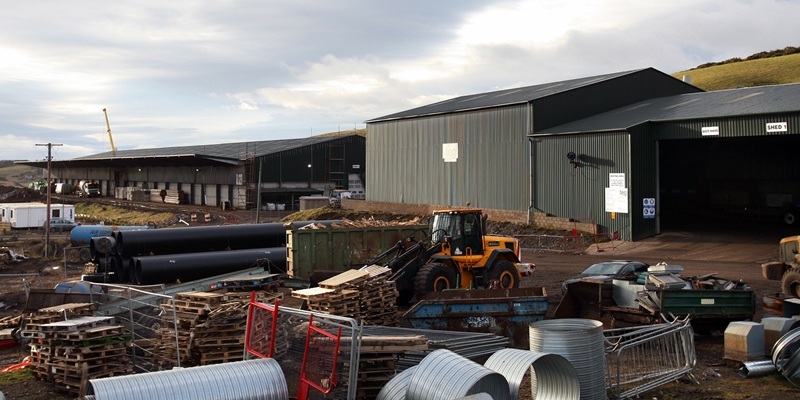A vile stench that left residents of a Perthshire village prisoners in their own homes cost the company responsible £14,000.
The fine was imposed at Perth Sheriff Court on TEG Environmental Ltd after they ran into problems with Scotland’s first commercial-scale composting facility, which they operate at Binn Farm, Glenfarg.
They admitted four charges of of pollution, three of breaching odour regulations and one of allowing leachate to escape.
Depute fiscal Rebecca Kynaston told the court the business had permission to turn green waste including fish waste and sewage sludge into compost in silos where through natural digestion the mixture reaches temperatures in excess of 70C.
The resulting compost is largely used by agriculture for soil improvement and is seen as an environmental benefit as it can be used instead of synthetic fertilisers.
In the first charge, which related to July 16, a complaint was received from a member of the public in Abernethy of a “sick, sour smell.”
Scottish Environmental Protection Agency (SEPA) officers attended and were again called out on August 14 when one witness, Mrs Elaine Marr of Perth Road, Abernethy, reported “a silage-type smell, only worse.”
“It smelt like something had died,” she told the SEPA staff. “I had to shut all the windows in the house to make sure it didn’t get into the house.”OffensiveAnother complainant described the smell as “disgusting and offensive,” and on the day in question the SEPA staff attended at the site and found the doors of the maturation shed open.
The third smell complaint was made on October 6 and Mrs Catherine Sangster of Perth Road in the village spoke of the impact it had on her.
“As a result of the smell I didn’t hang the washing out,” she said. “I’ve always lived on a farm or in a rural situation and knew that it wasn’t farming activity.
“The smell was much worse, more repulsive and concentrated. The odour was coming and going and as a result we stayed inside.”
Ms Kynaston said SEPA officers confirmed the smell at a location 3.6km from the site.
The final charge related to October 28 when SEPA officers discovered a pool of liquid on the ground at the rear of the maturation building where a reading taken from the leachate pool was 10 times higher than authorised for a soakaway.
Ms Kynaston that the company had made improvements that hopefully will resolve the issues.
“It is clear that the odour problem created by TEG on July 16, August 14 and October 6 last year had an effect on members of the local community and it is hoped that the new odour abatement system will avoid any future recurrence of those effects on the people of Abernethy,” she said.
TEG’s solicitor, Gordon McCreath, said they had been overwhelmed by the volume of green waste received under a contract from Perth and Kinross Council.Not deliberateMuch of it was contaminated with food waste that had to be shredded finer to meet regulations, but was not so successful in composting.
“The breaches of the odour conditions were not deliberate, reckless or negligent,” he said.
Mr McCreath said prosecution would have an impact on the group’s share price.
He said they were “not a fly-by-night” waste operator and they took environmental responsibilities seriously.
“It deeply regrets the release of odours and leachate on the days in question and has taken steps to ensure that it does not happen again,” he said.
TEG had made significant improvements since, costing over £1 million, bringing their total investment at Binn Farm to £3 million, he said.
Sheriff Lindsay Foulis said companies operating in waste recycling should make every effort to ensure there were no escapes of odour, liquid or anything else.
“It seems to me the company were caught by surprise by the amount of waste they were having to deal with,” he said.
Sheriff Foulis said it was significant the company had co-operated with SEPA before and after the offences.
